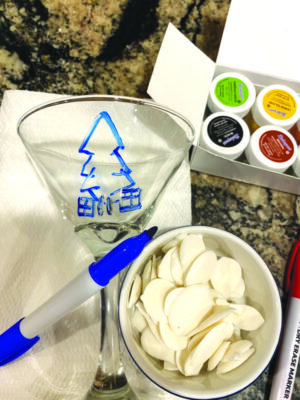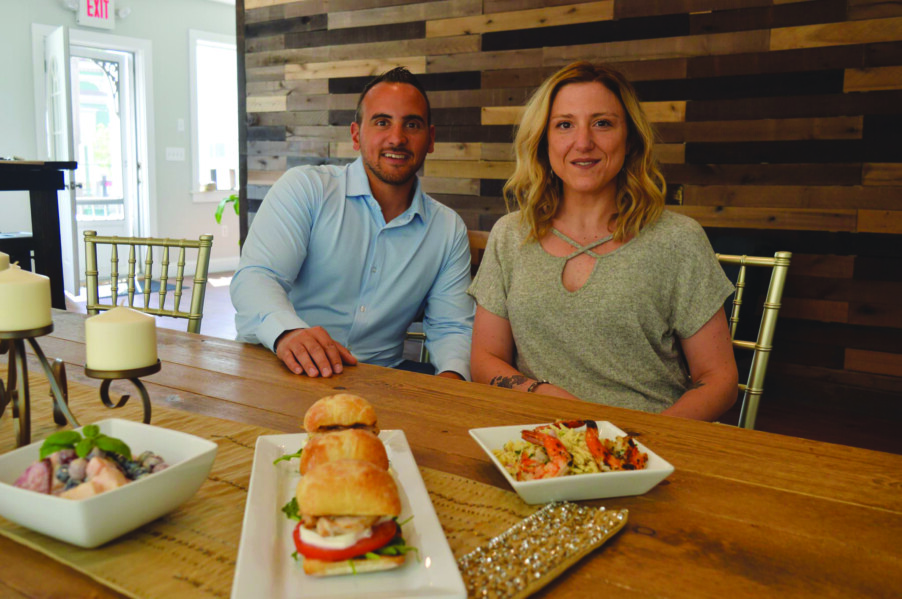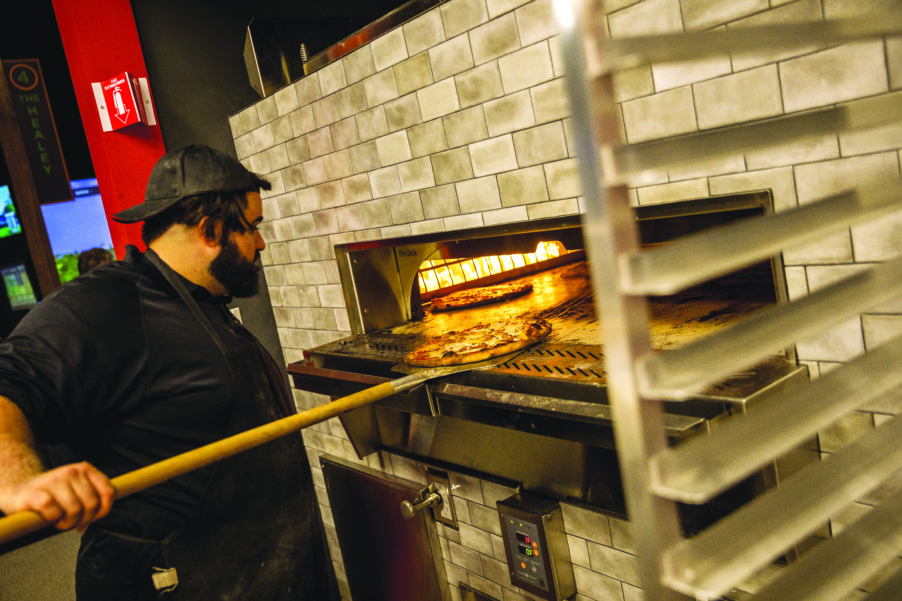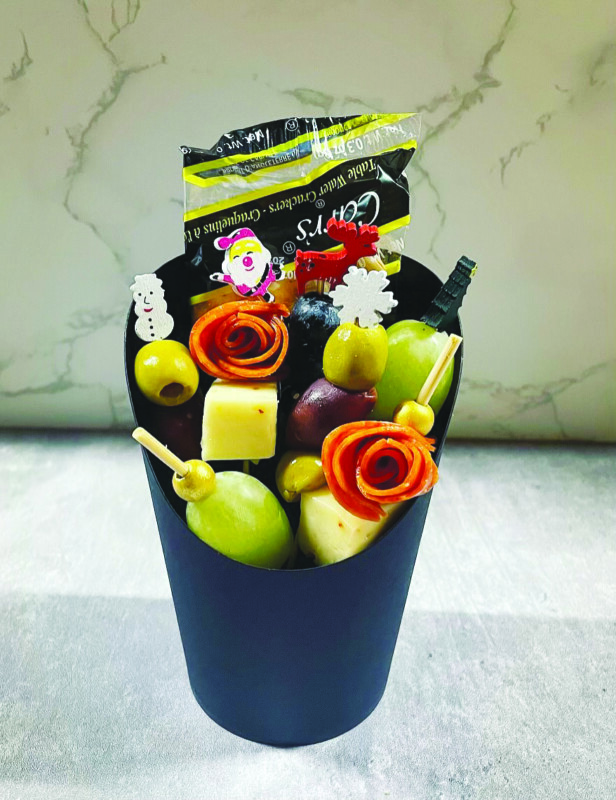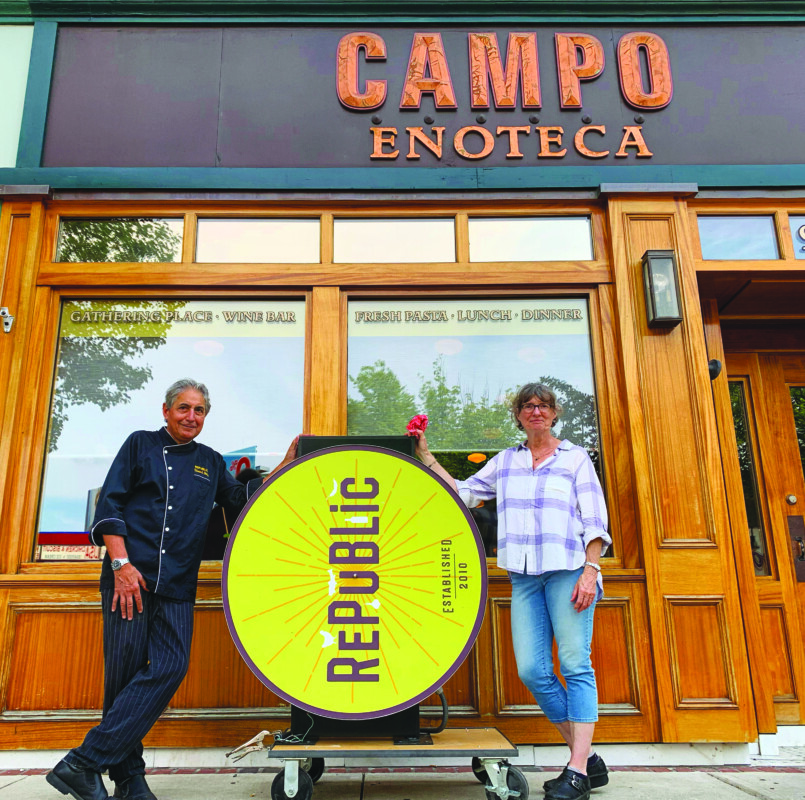Republic Cafe, Campo Enoteca to be put up for sale as owners retire
By Matt Ingersoll
mingersoll@hippopress.com
They’ve been James Beard award semifinalists, TED Talk presenters and pioneers of the local food movement. They’ve owned several successful Manchester restaurants spanning more than 30 years, including the first to receive “certified local” status by the New Hampshire Farm to Restaurant Connection.
And now, chef Edward Aloise and his wife, Claudia Rippee, are stepping away from the kitchen.
“We figured we should go out on a high note. Kind of like Joe DiMaggio,” Aloise, a New York City native, joked during a recent phone interview with the Hippo. “It’s kind of bittersweet. Half of our lives have been here in Manchester, and more than half our lives have been in this industry. But it’s time. It’s time to get on and move on to whatever phase is next in our lives.”
The plan, Aloise said, is for Republic Cafe and Campo Enoteca — two separate restaurant concepts that he and Rippee have operated under the same roof at 969 Elm St. as the “Republic of Campo” since August 2020 — to remain open normal business hours through New Year’s Eve. The downtown storefront will then soon be put up for sale as the couple prepares to retire.
But the pair’s decision to leave the business is not because their restaurants haven’t been doing well. On the contrary, in fact, both have remained as busy as ever. Aloise, who just celebrated his 69th birthday on Dec. 12, said he has plans to “resuscitate” their restaurant consulting company, E&C Hospitality and Consulting Services, while Rippee, an accomplished photographer and artist in her own right, aims to focus more on her craft.
“We are absolutely not running out of gas, but we do want to use what’s left in our tanks and go in a different direction,” Aloise said.
No matter what happens following the sale of the 969 Elm St. property, the fact remains that Aloise and Rippee will leave behind a decades-long legacy in the Queen City, a presence in the restaurant scene that will be missed by many. Here’s a look back on what they’ve accomplished.
From Colorado to Manchester
Aloise and Rippee met in Boulder, Colorado, of all places, back in the late 1970s.
“Claudia was a cocktail waitress and I was a bartender,” he said. “It was an over-the-bar love affair.”
They would end up getting married, continuing to work in the restaurant industry out west, in addition to a brief stint in Aloise’s home state of New York. Through a friend in Colorado with ties to the Massachusetts area, they soon found themselves moving to the seaside community of Gloucester. It was there that, Aloise said, they attempted twice to open their own restaurant concept, but they were unable at the time to acquire financing for it.
Another opportunity arose some 70 miles away in Manchester, where Aloise for a time worked as president of Hospitality Holdings Corp. But he and Rippee knew they still wanted to start their own restaurant concept. Eventually, they were able to put together a business plan that got financed and, in 1990, opened up Cafe Pavone in Manchester’s Millyard.
“There was no real Italian here at the time. What there was, was your basic red sauce, spaghetti and meatballs place,” Aloise said. “We brought in fresh pasta that we made daily. We were bringing in different regional Italian recipes as opposed to everything from Naples and Sicily. It had the first outside patio in the city [and] we had a wood grill, which was news to everybody. … It became a real central point for a lot of people in the city. Regular customers would have these little brass nameplates around the bar and we used to call it the Walk of Shame. That’s how people were identifying with it.”
Enjoying a 10-year run throughout the ’90s, Cafe Pavone was named for the Italian word meaning “peacock.”
“We wanted to bring a little bit of color, a little bit of life, a little bit of versatility to the city, and we thought the name stuck,” Aloise said.
Their success just a few years after opening Cafe Pavone led them to an opportunity to start a second restaurant concept at Manchester-Boston Regional Airport — known as the Milltowne Grille — in January 1994.
By 2000, they decided it was time for a change — Cafe Pavone was sold, and Aloise and Rippee would start E&C Hospitality and Consulting Services, an initiative that continued throughout most of that decade.
“The airport [restaurant] was extremely successful at that point, so we had a little bit easier life for a while,” Rippee said.
Fresh from the farm
As Aloise put it, he and Rippee soon “got the bug to do it again,” and that was when Republic Cafe would arrive at 1069 Elm St. in downtown Manchester in January 2010. But this restaurant would be a totally different concept, ushering in a new philosophy for several other New Hampshire eateries that would follow.
“I’m a pescatarian, and I said that if we do another restaurant, then I did not want to deal with any factory-farmed animal products,” Rippee said, “and so that’s how we got involved in looking for local producers.”
Today, Republic is renowned not only for its scratch-cooked kitchen and pan-Mediterranean cuisine, but also for its commitment to sourcing from local farmers. But it didn’t catch on right away; in fact, Aloise refers to the first year and a half or so of being open as a little rocky.
“People were not really ready for a pan-Mediterranean restaurant,” he said. “Twenty-eight countries touch the Mediterranean and Claudia and I researched recipes from all 28 of them.”
That all changed in 2012, when they achieved semifinalist status for Outstanding Restaurateur in that year’s James Beard Foundation awards.
“That was the trajectory that really took Republic into the stratosphere,” Aloise said.
That same year, both Aloise and Rippee gave a joint TED Talk presentation about the importance of farm-to-table restaurant practices. Their talk detailed many of the local farms they have worked with and the products they buy from each, as well as the process of how they are continuously in contact with them to help shape their restaurant menus. Many of the farmers, Rippee noted, have been working with them from the very beginning — the list can be viewed on Republic’s website.
“When you couple the farm-to-table concept with recipes coming from Morocco and Turkey and Greece and southern Italy, and even Egypt and Israel for that matter, it shocked some people, but then eventually people said, ‘Wow, I’m not eating a piece of salmon on a Caesar salad anymore,’ and that’s what happened,” Aloise said.
Aloise and Rippee continued to operate the Milltowne Grille simultaneously with Republic until 2014. But when Southwest Airlines announced it was leaving Manchester’s airport to become a carrier down in Boston, that was when they noticed a sharp drop in volume, Aloise said.
“It became a non-viable entity and our lease was up anyway, so we decided to move,” he said. “But we had employees that were there with us for a decade, and so we had that human capital and decided not to waste it.”
That April, Campo Enoteca opened its doors at 969 Elm St., just a two-minute walk south of Republic. As opposed to its Mediterranean counterpart, this was an Italian restaurant serving house pastas and small plates, but still in line with the farm-to-table theme.
The Republic of Campo
Republic celebrated its 10th anniversary in business in January 2020, releasing a special “meet the farmers” Q&A series to commemorate the milestone.
Two months later, on March 16, came Gov. Chris Sununu’s emergency order limiting all restaurants and bars in New Hampshire to takeout and delivery only in response to the Covid-19 pandemic. Both Republic and Campo Enoteca initially joined the dozens of other local restaurants in offering a special takeout and delivery menu, but the decision was soon made to shut down operations at both for the remainder of the governor’s dine-in ban.
As the pandemic stretched into the summer, by mid-August it was determined that Republic’s physical plan would be incompatible with the spacing requirements.
“Inside, you had to have 6 feet between tables … but at Republic it was one long line of seating down the right-hand side of the building and an 18-seat bar,” Rippee said, “so we probably could’ve gotten maybe 20 seats out of 60 and comply with the Covid guidelines, and that would not have supported what it took to reopen that location.”
Instead, Aloise and Rippee decided to leave the 1069 Elm St. location altogether and move all of Republic’s operations under the same roof as Campo Enoteca.
“One of the benefits was that a lot of our staff, especially the kitchen staff, moved between both restaurants,” Aloise said. “Everybody was familiar with all of the menus, all the recipes, all the descriptions of the product or the style of cooking that I had, and so we sat down with [partner and manager] Peter [Macone] and my chef de cuisine at the time, and I said, ‘This is what I want to do, how do we do this,’ and everybody was on board immediately.”
In the two years since, they’ve successfully been able to offer two separate menus for both restaurants under one location — dubbed the “Republic of Campo.” Whether or not that concept will continue, Aloise said, is all up to the eventual purchaser.
As Aloise plans to hang up his apron, he remains optimistic about the future of the hospitality industry, but he does predict there will be many changes.
“I think what’s probably going to happen is that people are going to react to the market,” he said. “You’re going to see concepts that are less labor-intensive and concepts that are more cost-effective. You’re going to see less full-service. … Tablecloth restaurants, upscale restaurants are going to go the way of dinosaurs for the most part.”
Featured photo: Chef Edward Aloise and his wife, Claudia Rippee. Courtesy photo.

